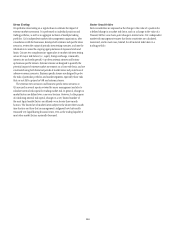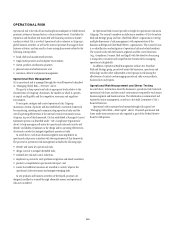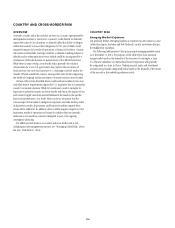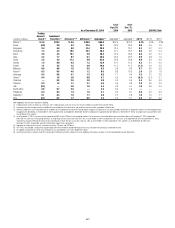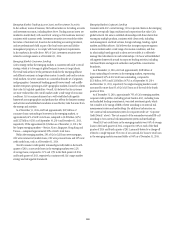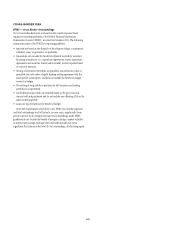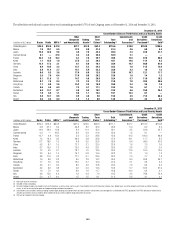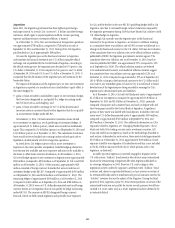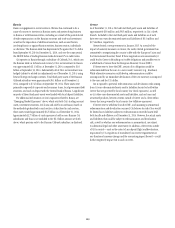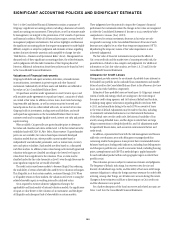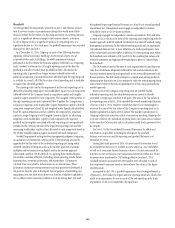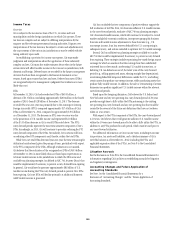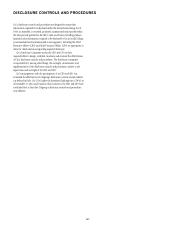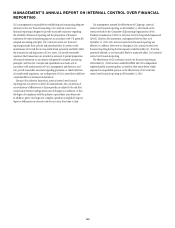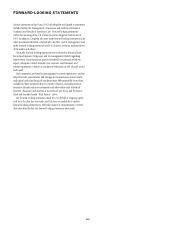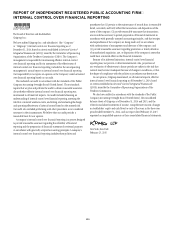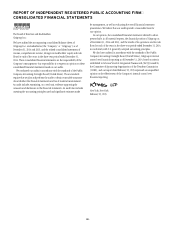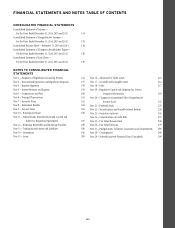Citibank 2014 Annual Report Download - page 140
Download and view the complete annual report
Please find page 140 of the 2014 Citibank annual report below. You can navigate through the pages in the report by either clicking on the pages listed below, or by using the keyword search tool below to find specific information within the annual report.123
Russia
Russia’s engagement in recent events in Ukraine has continued to be a
cause of concern to investors in Russian assets and parties doing business
in Russia or with Russian entities, including as a result of the potential risk
of wider repercussions on the Russian economy and trade and investment
as well as the imposition of additional sanctions, such as asset freezes,
involving Russia or against Russian entities, business sectors, individuals
or otherwise. The Russian ruble has depreciated 43% against the U.S. dollar
from September 30, 2014 to December 31, 2014, and over the same period,
the MICEX Index of leading Russian stocks decreased 1% in ruble terms.
Citi operates in Russia through a subsidiary of Citibank, N.A., which uses
the Russian ruble as its functional currency. Citi’s net investment in Russia
was approximately $1.1 billion at December 31, 2014, compared to $1.6
billion at September 30, 2014. Substantially all of Citi’s net investment was
hedged (subject to related tax adjustments) as of December 31, 2014, using
forward foreign exchange contracts. Total third-party assets of the Russian
Citibank subsidiary were approximately $6.1 billion as of December 31,
2014, compared to $7.4 billion at September 30, 2014. These assets were
primarily composed of corporate and consumer loans, local government debt
securities, and cash on deposit with the Central Bank of Russia. A significant
majority of these third-party assets were funded with local deposit liabilities.
For additional information on Citi’s exposures related to Russia, see
“Emerging Market Exposures” above, which sets forth Citi’s trading account
assets, investment securities, ICG loans and GCB loans in Russia, based on
the methodology described in such section. As disclosed in such section,
these assets totaled approximately $6.5 billion as of December 31, 2014.
Approximately $2.7 billion of such exposure is held on non-Russian Citi
subsidiaries and thus is not included in the $6.1 billion amount set forth
above, which pertains only to the Russian Citibank subsidiary, as disclosed.
Greece
As of December 31, 2014, Citi had total third-party assets and liabilities of
approximately $36 million and $915 million, respectively, in Citi’s Greek
branch. Included in the total third-party assets and liabilities as of such
date were non-euro denominated assets and liabilities of $0.3 million and
$174 million, respectively.
Greece elected a new government in January 2015. As a result of the
impact of austerity measures on Greece, the newly elected government has
committed to renegotiating the country’s debt with the European Union and
the International Monetary Fund. If these negotiations are unsuccessful, it
could lead to Greece’s defaulting on its debt obligations and possibly even to
a withdrawal of Greece from the European Monetary Union (EMU).
If Greece were to leave the EMU, certain of its obligations could be
redenominated from the euro to a new country currency (e.g., drachma).
While alternative scenarios could develop, redenomination could be
accompanied by an immediate devaluation of the new currency as compared
to the euro and the U.S. dollar.
Citi is exposed to potential redenomination and devaluation risks arising
from (i) euro-denominated assets and/or liabilities located or held within
Greece that are governed by local country law (local exposures), as well
as (ii) other euro-denominated assets and liabilities, such as loans and
securitized products, between entities outside of Greece and a client within
Greece that are governed by local country law (offshore exposures).
If Greece were to withdraw from the EMU, and assuming a symmetrical
redenomination and devaluation occurred, Citi believes its risk of loss would
be limited as its liabilities subject to redenomination exceeded assets held
both locally and offshore as of December 31, 2014. However, the actual assets
and liabilities that could be subject to redenomination and devaluation
risk, as well as whether any redenomination is asymmetrical, are subject
to substantial legal and other uncertainty. In addition, other events outside
of Citi’s control—such as the extent of any deposit flight and devaluation,
imposition by U.S. regulators of mandatory loan reserve requirements or
any functional currency change and the accounting impact thereof—could
further negatively impact Citi in such an event.



